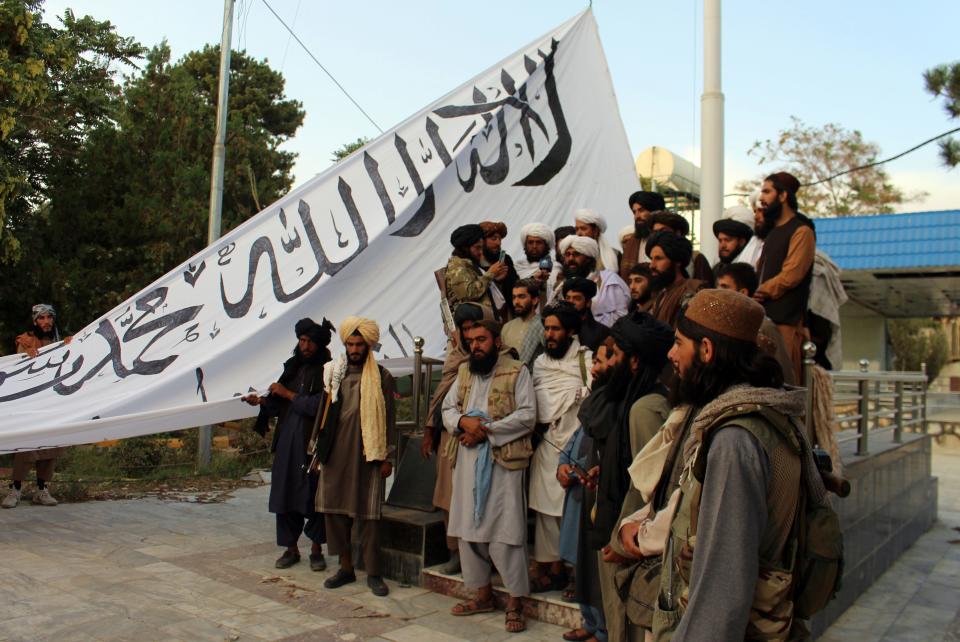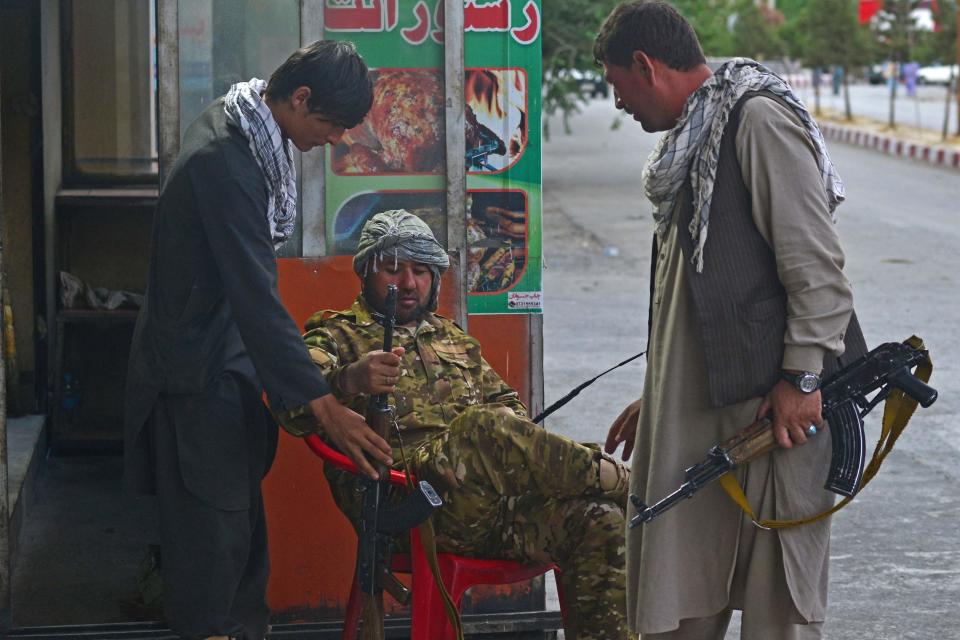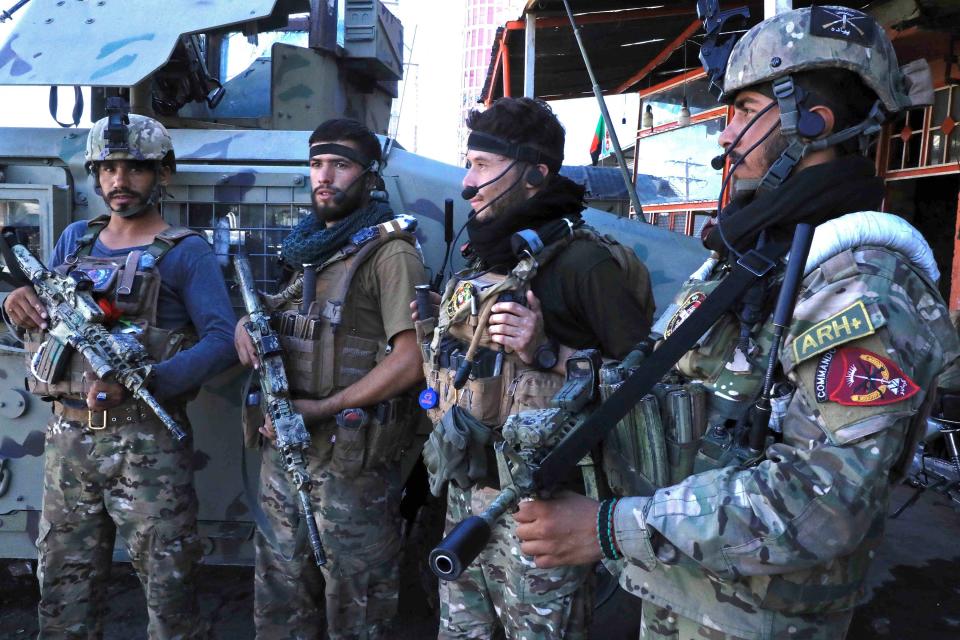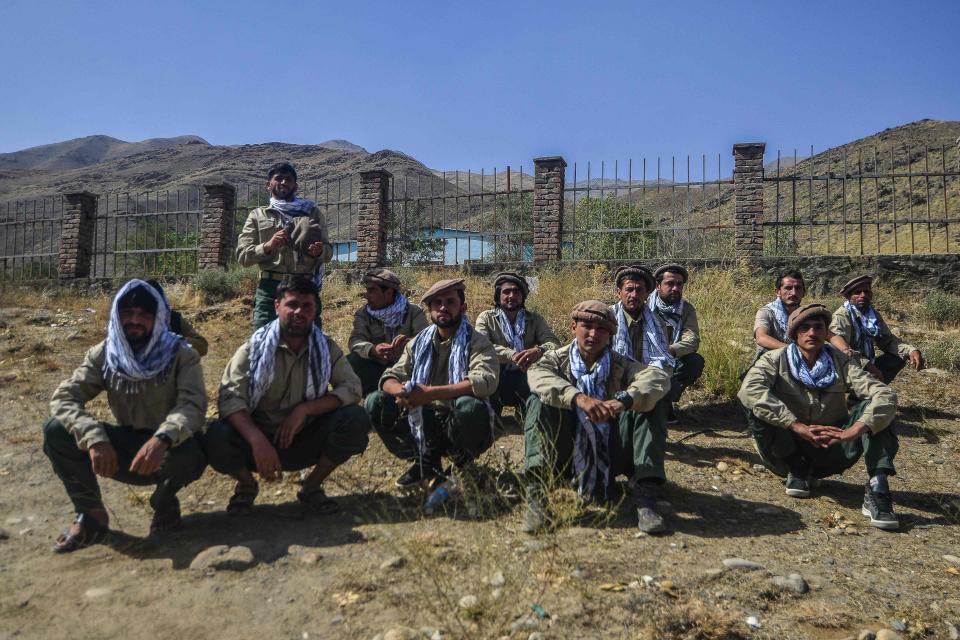'Nobody should be surprised': Why Afghan security forces crumbled so quickly to the Taliban
- Oops!Something went wrong.Please try again later.
WASHINGTON – As the Taliban started to gain territory in Afghanistan at an alarming rate last month, President Joe Biden was asked whether a Taliban takeover was inevitable.
"Not, it is not," Biden told reporters at the White House on July 8, hailing the 300,000 Afghan National Security Forces as "well equipped as any army in the world" and comparing those numbers to the Taliban's estimated 75,000 fighters. "It is not inevitable."
The president's optimism about the abilities of an army trained and funded by the U.S. proved wildly miscalculated over the weekend as the Taliban routed Afghan security forces and seized control of the government amid the chaotic U.S. military exit.

More: Afghanistan in chaos as thousands try to flee Kabul after Taliban takeover
Images of Afghan citizens clinging to U.S. military planes departing the airport in Kabul drew comparisons to the U.S. abandonment of Saigon at the end of the Vietnam War and invited widespread criticism of Biden's decision to end America's 20-year military occupation of Afghanistan.
Most U.S. military senior leaders, including commanders on the ground, did not foresee the collapse of the Afghan National Security Forces, according to a U.S. official who was not authorized to speak publicly. But former military officers who served in Afghanistan said there were signs the Afghan military – unmotivated, disorganized and plagued by low morale – would struggle against the Taliban.
"They were evident for a long time," said retired Lt. Col. Daniel Davis, a twice-deployed veteran of the war in Afghanistan. "Nobody should be surprised by these outcomes if they had been paying attention."
More: A timeline of the US withdrawal and Taliban recapture of Afghanistan
Unmotivated to fight for 'corrupt' government
The U.S. pumped more than $80 billion in equipment and training into the Afghan security forces since the start of the war in Afghanistan, which the U.S. launched to root out al-Qaida after the 9/11 attacks.
But Davis said Afghan security forces were unmotivated to fight for a government and military that "top to bottom was incredibly corrupt." As a result, he said, the Afghan army just "melted away," giving way to the Taliban without putting up a fight in most cities.

Davis described the response from Afghan soldiers on the ground as apathetic: "'I'm not going to die for a government that doesn't even take care of me, that doesn't pay me very well, and that doesn't even give me food, bullets, resupply things, doesn't give us backup when we need help.'"
Rather than dig in, soldiers calculated they couldn't defeat the Taliban, experts say.
The withdrawal of U.S. military backing, particularly airstrikes, and the Taliban gaining support from Pakistan, China, Iran and Russia, left Afghan forces largely on their own.
“Afghans read the tea leaves,” said Seth Jones, senior vice president at the Center for Strategic and International Studies and a former adviser to the commander of U.S. Special Operations in Afghanistan. “All the major countries – probably except India – in the region had come to terms with the Taliban government. The U.S. was not going to be there, nor the Europeans. Therefore, it made no sense to fight and die because the odds were stacked heavily against them.”
What we know: How did the Taliban retake Afghanistan so quickly?
For the past several years, elite Afghan commandos and other units had operated effectively on their own for the most part, Jones said. But backup from U.S. warplanes and the tangible commitment of American troops in Afghanistan gave them an edge.
“I don't see this as poor training, per se, of the Afghan national security apparatus, or poor equipment or inability to do logistics,” Jones said. “One of the key aspects that failed at the end was morale.”
Gil Barndollar, a former Marine who also served twice in Afghanistan and a senior fellow at Defense Priorities, a group that supported the withdrawal, pointed to the Afghan army's annual turnover – one-third of the entire force in recent years. He said combat deaths, wounds, failure to reenlist and desertions all contributed. In 2017, The New York Times reported that Afghan army recruitment in some provinces dropped by 50%.
"That was not a sustainable situation," Barndollar said. "Afghan security force attrition fatally undermined any contention that we were in a stalemate, or if we could have sustained things if there was a third option of continuing to do what we had been doing."
Barndollar said the disastrous outcome was "baked in" after 20 years of a failed war. "Trying to execute a flawless end game after that, to me, is like cramming for a final the night before after failing a course all semester."
More: 'They already looking for me': An Afghan interpreter on the last 24 hours
U.S. concerns about the Afghan army go back years
Active military leaders questioned the preparedness of the Afghan security forces in recent years.
Nearly three years ago, Marine Gen. Kenneth "Frank" McKenzie, the top U.S. general for the Middle East, raised concerns publicly about the Afghan military's ability to defend itself. "If we left precipitously right now, I do not believe they would be able to successfully defend their country," McKenzie, then the incoming head of U.S. Central Command, told Congress in December 2018.

In April, McKenzie told a Senate committee he was concerned “about the ability of the Afghan military to hold on after we leave.”
The Washington Post in 2019 publicized a trove of previously undisclosed interviews of military officers that described the Afghanistan forces as undisciplined and incompetent. Afghan police deserted their jobs with their government-issued weapons to set up their own private checkpoints to extort travelers, Thomas Johnson, a Navy official, said in one interview.
The Afghan soldiers were "stealing fools" who looted equipment supplied by the U.S., said Victor Glaviano, who worked with the Afghan army as a U.S. combat adviser from 2007 to 2008. Glaviano complained to interviewers that the Afghan troops had "beautiful rifles, but didn’t know how to use them" and were wasting ammunition.

Meanwhile, the Taliban changed their approach from two decades ago.
In the years since the Taliban's 2001 defeat, they “got smart” and negotiated peaceful transfers of power in parts of Afghanistan, said Michael O’Hanlon, a national security expert at the Brookings Institution. That mitigated the downside of defeat for those who had backed the Afghan government and contributed to the sense of inevitability for the Taliban.
“It looks like a snowballing to me,” O’Hanlon said. “Afghans don’t like to be on the wrong side of a losing fight. When we pulled out so fast, with little development of a credible strategy or plan for how the Afghan security forces could secure at least part of the country on their own, many were discouraged.”
White House now says it knew the fall of Kabul was 'a possibility'
In July, Biden quickly rejected any comparisons of the Afghanistan exit to the U.S. withdrawal in Vietnam in 1975 before the North Vietnamese rolled into Saigon.
"None whatsoever," Biden said. "Zero. What you had is, you had entire brigades breaking through the gates of our embassy."
He continued that the Taliban is "not remotely comparable in terms of capability" to the North Vietnamese Army.
"There's going to be no circumstance where you see people being lifted off the roof of a embassy in the – of the United States from Afghanistan. It is not at all comparable."
But talking points distributed by the White House Monday said: "The administration knew that there was a distinct possibility that Kabul would fall to the Taliban. It was not an inevitability. It was a possibility."
More: What President Joe Biden said in his address on Afghanistan
In a speech from the White House defending the military withdrawal, Biden said the U.S. should not fight a war that "Afghan forces are not willing to fight for themselves." He said the Afghan army was larger than militaries of many NATO allies and noted that it had something the Taliban lacked: an air force.
"We gave them every chance to determine their own future. What we could not provide them was the will to fight for that future."
Reach Joey Garrison on Twitter @joeygarrison.
This article originally appeared on USA TODAY: Why Afghan security forces crumbled so quickly to the Taliban

